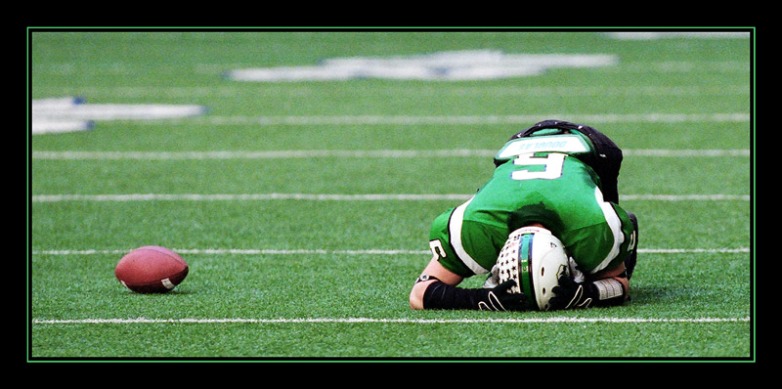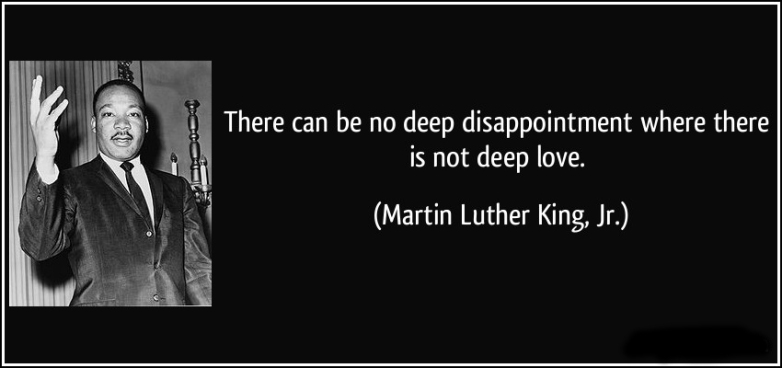This post broadens our analysis of the fake interpreter episode by looking at responses from interpreting organizations, especially RID here in the United States.
I felt devastated and frustrated when I watched the interpreting disaster Mandela’s funeral last week. To me, it symbolized the systemic, global, unequal treatment of Deaf persons. But when I watched RID’s Dawn Whitcher’s response to the interpreter scandal, I felt a disappointment of a different kind. Sort of how I felt to watch the undefeated OSU Buckeyes lost to Michigan State in the Big Ten Championship game the other week.
Dawn is the president of RID, the Registry of Interpreters for the Deaf, the organization that represents over 12,000 interpreters in the U.S. She is a talented and passionate interpreter, and I respect her commitment to RID. It takes courage to put yourself online with a public statement. However, the statement that RID released on YouTube and on their website struck me as a missed opportunity. I want to explain why I feel that way, and also present some counter-examples and solutions.
RID Official Statement on Fake Interpreter
Let’s start with the video. Several years of research on undocumented immigration enforcement have made me sensitive to the way that political issues become represented in popular media. Let me remind everyone that sign language interpreters haven’t received this much attention since Marley Matlin won the Oscar for Children of a Lesser God in 1986. This is a crucial moment for RID. Click here for the English statement, and here’s the video statement:
Here’s my impression. I wonder if you feel the same. First, I thought the video was emotionally flat, which contrasts sharply with the utterly outrageous circumstances that RID was responding to. I think this is an outcome of the overly-reflective nature of the content. I understand that we are all trying to be patient and understand exactly what happened. But from an organizational perspective, we need something punchy. Let’s see some passion!
Second, the statement wandered and compromised its own authority. I waited and waited for something specific until the president started signing “…and now RID wants to offer our OPINION, too”. I went livid in my chair. Opinion? RID is supposed to be the premier interpreting organization in the U.S. RID is our organization of representation because they are experts in providing, managing, and certifying interpreting services. RID doesn’t have an “opinion” (in my opinion). RID has an authoritative statement based on 50 years of experience, on behalf of 12,000 (oops, that’s AILA, got my orgs mixed up) 16,000 members, and in support of (about) one million Deaf people who use interpreting services in the U.S. Now is not the time to be circumspect. Be bold!
Third, there didn’t seem to be any direct point to the video. RID says it was “SHOCKED”, but there was nothing substantively shocking about what they had to say in response. The signed version has some thoughtful comments about language as a human right, but even when the statement is signed “VIOLATED THOSE RIGHTS”, it is signed with an uncertain tone, that reads like this: “Well, I guess this guy probably violated the language rights of Deaf people?” (rising intonation at the end). For a good counter-example, see NAD’s YouTube statement on protecting Deaf schools – you really get a sense that we need to respond urgently to the needs of Deaf student now! I’ve also searched RID’s English translation for a single strong affirmative statement. Instead, it’s filled with waffling, equivocating, pensive sentences that reads like a meditation on some minor insult from the distant past.
[Added: As Zizek claims in the Guardian, this depoliticized appropriation of Mandela is symptomatic of the act of ignoring the ongoing crisis around the world and in South Africa today: growing inequality, ongoing racism, environmental degradation, etc.. In other words, drawing on Mandela’s quotes in isolation without drawing on his fervent activism is the central contradiction of the politics of Mandela’s memorialization.]
Most important, RID’s statement announces a big question, How can we prevent this unfortunate and oppressive situation from happening again? Exactly what we all want to know. But the statement itself can’t seem to identify the problem or a point towards a tangible solution. [Added: Again, just to be clear: this is not a fault of RID or of Dawn. But it is an indication of the crisis of meaning in late capitalism. See my posts on Judith Butler and Gramsci for related material.]
I don’t intend for my comments to be harsh. My criticism is out of my deep desire to see RID wildly succeed as the collective face of interpreters in the U.S. The stakes are high and the opportunity is unique. It’s important for all of us – not just RID – to be ready to respond to moments like this.
We can do better
Someone once told me that pointing out a problem without identifying a solution is complaining. I wouldn’t write this critical public statement about an organization I love without pointing out what we can do better. Let’s start by looking at statements from other organizations similar to RID.
EFSLI (European Forum for Sign Language Interpreters) opened up their snappy, one-paragraph statement with this sentence. Think about how it contrasts to RID’s statement, and how EFSLI prioritize a major point from the beginning.
“The world is at last taking notice that untrained and, as in this case, incompetent interpreters are denying Deaf people access to important events that the rest of us take for granted.”
Slam! A reporter can easily put that into a column. No beating around the bush, no hedging, no waffling, no pensive meditations on a quote by Mandela. And whose fault is this “scandal”? EFSLI answers:
“…it is the fault of the policy makers who often don’t think it is important that those who work to give Deaf people access to the essential services we take for granted are properly trained.”
Ouch! Heads up elected leaders – we expect you to do better. And EFSLI is doing better. They wrote their statement alongside the “the European Parliament launching its ‘Learning Outcomes’ for interpreter training programmes. The initiative, which has been fully supported by the European Commission, is just the latest example of EFLSI’s commitment to raising the standards of interpreting across Europe and, with it, the ideal of full citizenship for Deaf people.” Knockout! EFSLI is doing something about this problem as we read the statement. We need to learn from this. We need to have a short, snappy statement that is backed up by meaningful, direct action.
Let’s turn to ASLI (Association of Sign Language Interpreters), our sister organization in the UK. They quote from the WASLI/WFD statement (which I think is a little soft, too). But then open up with this:
ASLI strongly advocates the use of appropriately qualified interpreters in all domains. The sad incident at the Mandela memorial is not a one off occurrence. In the UK unqualified or inappropriate individuals are often used in place of trained and qualified interpreters. This has been central to many of our campaign messages.
There are two examples here that could be incorporated in the the RID statement. First, they have a clear statement of what they advocate for, and what they advocate against. Second, they bring it back to how ASLI is creating programs right now to solve this problem. The ASLI statement goes on to mention a specific program they are working on now to make sure that “only appropriately trained and NRCPD registered interpreters are used in health care domains.” In contrast, RID’s statement doesn’t take a clear stand for and against, and doesn’t mention any of its own programs by name. It might leave the reader wondering, is RID doing anything to improve the quality of interpreting in the U.S.?
Why does this matter? I mean, it’s just a little public statement, right? Wrong. We interpreters should know better than anyone how important it is to say things accurately and powerfully. Press releases may seem irrelevant. But press releases are often what drive news articles, get cited in academic research, and preserve the history of the profession in the permanent record. Especially at a time when interpreters have more public attention, we need to get this right.
How Would You Rewrite RID’s Public Statement?
Here’s my attempt to rewrite the statement. It’s not perfect. But I hope that it provides an example of a more assertive, powerful statement – the kind of statement I would have liked to see from RID. It’s not too late. RID could edit their statement to make it stronger.
“The Registry of Interpreters for the Deaf (RID) strongly condemns the disgraceful quality of sign language interpreting services provided at Nelson Mandela’s memorial service in Johannesburg, South Africa on December 10, 2013. Mandela’s life-long fight for justice should have been commemorated by being accessible to the South African Deaf community as a linguistic and cultural minority. Instead, allies and members of the Deaf community suffered an injustice at the hands of an unqualified and unvetted interpreter who failed to provide even a minimum level of access for sign language users. Yet we recognize that this unfortunate event is not the result of one individual, nor is this an isolated incident. Unqualified interpreters are frequently hired out of convenience rather than based on professional credentials. We hope that this raises the public awareness of the systemic injustice to the Deaf community and the detrimental effect this has on businesses and federal agencies who mistakenly or willfully hire unqualified interpreters. RID has worked hard for 50 years to raise the quality of sign language interpreting services. Today we administer the most widely recognized professional interpreter credential, the National Interpreter Certification, in partnership with the National Association for the Deaf. We stand with our over-12,000 U.S. members and the global Deaf community in this moment of disappointment. We call on our elected leaders, leaders in the business community, and the wider concerned public to work with us to make sure this situation doesn’t happen again.”
Update (12/17/2013): I noticed that RID was mentioned in a news report was today on the PBS “Lost in Translation” article, and the this NYT article. I’m glad to see coverage.



As a UK interpreter, I have pretty much the same feelings about ASLI’s response. Just would like to point out that ASLI is not really a direct equivalent of RID – it is just one of four professional membership organisations in the UK which are related to BSL/English interpreting and communication support. The UK Register of qualified and trainee interpreters (our very, very rough equivalent of “certification”) is held by a fifth organisation called NRCPD, who were also slow and lacklustre in their response. Missed opportunities all round.
What resonated particularly well with me in the efsli response (they like lower case for some reason) was that it focuses the blame on the holders of purse strings, and goes out of its way to avoid castigating un- and under-qualified interpreters, who (for all we know) might well be practicing safely and wish desperately to improve but face insurmountable financial barriers to qualification routes.
It would be a terrible shame if the only result of all this bad publicity was yet another witch-hunt.
Hi, Matt. I totally agree with the witch-hunt problem. I can’t emphasize enough how much of a problem this is in the States. Thanks for the clarification on ASLI, too. I added your blog to the “Interpreter’s Library” part of my site. I’ll be watching your blog.